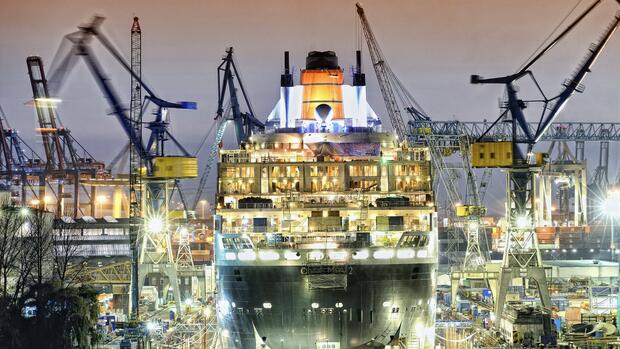Berlin With a 66-point package of measures, the traffic light coalition wants to counter the concern that the increasing dominance of Asian countries in shipbuilding, waterway infrastructure and energy transport across the sea will bring the German economy into new dependencies. That is why she wants to strengthen the domestic maritime economy and enable it to play a decisive role in the energy transition.
If the SPD, Greens and FDP have their way, the state should become a key player in strengthening the maritime economy. This is what it says in an application that the parliamentary groups decided on Tuesday evening. The paper is available to the Handelsblatt. “The application is an ambitious task for the federal government,” said Felix Banaszak from the Greens.
Among other things, the traffic light suggests building a “climate-neutral federal fleet”. The orders are intended to help advance the transformation in shipbuilding. Internationally, the traffic light coalition wants to work to ensure that shipping becomes climate-neutral by 2050. Presumably this will happen with hydrogen. So far, alternative drives have been very expensive, which is why the switch has hardly taken place.
Shipyards: The energy transition has the potential to cost billions
The maritime economy in Germany has changed. Fear of the future now dominates. In recent years, many shipyards have been more conspicuous because of financial problems that threaten their existence than because of new large orders. According to the Shipbuilding and Marine Technology Association (VSM), more than half of all orders for civilian ships went to China last year. Another almost 40 percent of the orders received shipyards in South Korea. This increases the dependency of European shipping.
The government coalition wants to stop the downward trend. “We want to keep as much domestic value creation as possible in our country,” said Dieter Janecek (Greens), the federal government’s maritime coordinator, to the Handelsblatt. After all, there is a lot of money to be made in the energy sector in the coming years: the federal government expects that more than 400 gigawatts of offshore wind capacity will be installed in the North Sea and Baltic Sea in Europe over the next two decades. “This involves a gigantic investment volume of up to one trillion euros,” said Janecek.
The German ports also lag behind in an international comparison.
(Photo: IMAGO/Nikito)
For example, it is necessary to manufacture huge “converter platforms” at sea. “We want to keep as much domestic added value as possible in our country,” said Janecek. In Germany, the statutory expansion target for offshore wind energy is 40 gigawatts by 2035. Areas in the North Sea and Baltic Sea have already been designated for up to 36.5 gigawatts of new capacity. The traffic light now wants to speed up even more and identify additional areas for ten gigawatts of power.
Havens: Against the downtrend
In addition to the shipping industry, the coalition is also looking at the ports. Recently, the parties had argued fiercely whether – in view of the new geopolitical situation – the Chinese state shipping company Cosco should participate in a terminal in the Port of Hamburg.
>> Read here: Federal government allows Chinese shipping company Cosco to participate in Hamburg terminal
Many ports are considered critical infrastructure. They have also been shown to be important in supplying the country with energy. Liquefied natural gas (LNG) ships have been chartered to replace Russian gas supplies. The first terminals were also quickly built.
The parliamentary groups propose that the necessary infrastructure be permanently created at the German ports to import and store gas, hydrogen and other energy sources. “Our ports can become the hubs of a renewable energy system,” said Banaszak.
>> Read here: CDU and CSU want to protect ship production in Europe
The coalition wants to support the construction financially. “Our application is the starting signal for adapting the political framework to the new situation in the world,” explained Hagen Reinhold, maritime spokesman for the FDP.
The ports need new impetus. The German seaports – above all Hamburg – are increasingly losing market share to the competition in Rotterdam and Antwerp. The Polish ports and those in the Mediterranean are also causing problems for the domestic seaports.
In 2022, goods handling in Germany fell by 3.2 percent to a total of 279.1 million tons compared to the previous year, and the ports handled 6.3 percent fewer containers. Measured against the pre-crisis level of 2019, the tonnage fell by 4.9 percent. The German ports are particularly affected by the lack of Russian ship transport across the Baltic Sea.
Security: establishment of an all-German coast guard
In addition to factors relating to economic security, the traffic light application also addresses the question of how security in the maritime infrastructure can be guaranteed. Since the attacks on the Nord Stream gas pipelines, there has been concern that there could be further attacks on other pipelines, which would endanger local energy supplies.
>> Read here: Three shipping cartels earn billions from supply bottlenecks – and the EU is watching
Therefore, the traffic light proposes to create a “German Coast Guard”. This would bring together the units of the federal government and the coastal states. In addition, the protection of critical maritime infrastructures must be organized across authorities, for example in the Maritime Security Center (MSZ) in Cuxhaven.
This Friday, the Bundestag wants to discuss the coalition’s application and also an application from the CDU and CSU. Among the 95 points of the opposition is the demand to link European subsidy programs for the construction of new ships to “binding value-added clauses or clauses for production in the EU” and to secure large orders with guarantees.
More: Lindner saves on the railway network – the board speaks of a “disaster”
